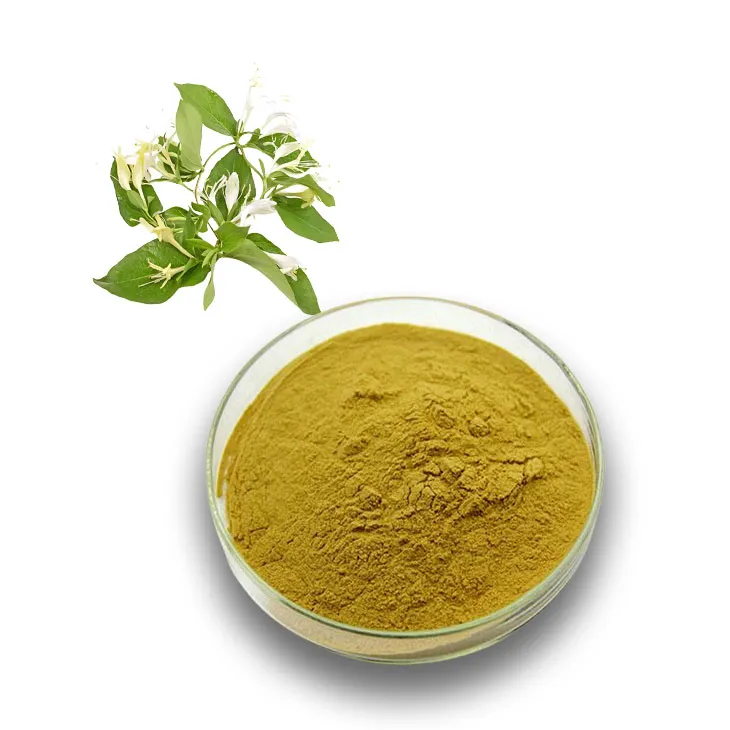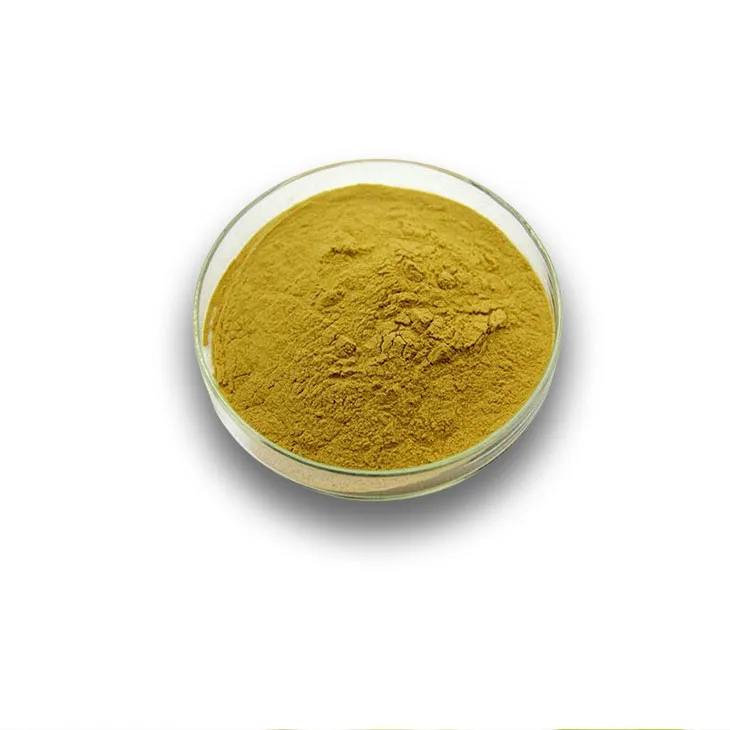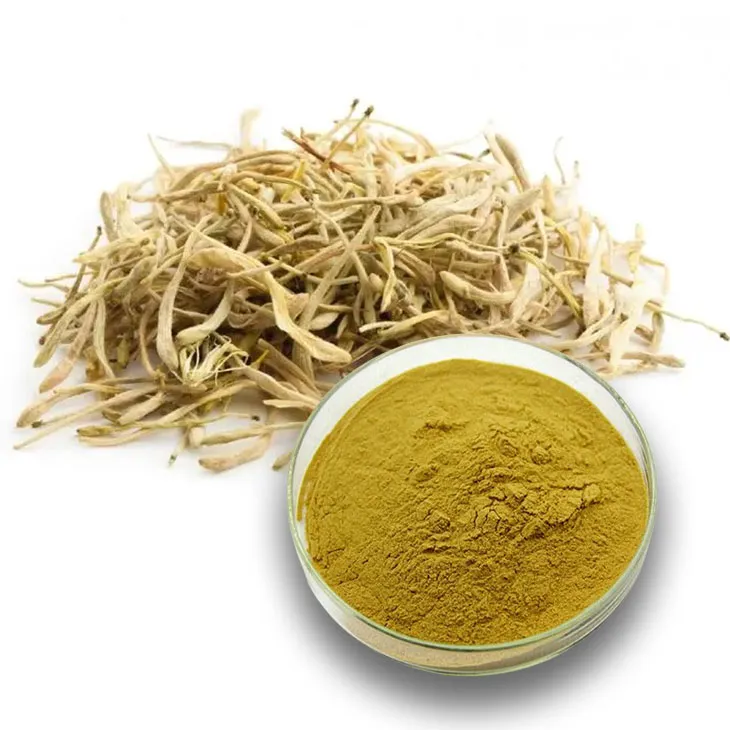- 0086-571-85302990
- sales@greenskybio.com
The Benefits of Honeysuckle Pollen: An Impressive Extract on the Kitchen Table.
2024-11-14

Introduction
Honeysuckle Pollen is a natural and often overlooked extract that can bring a host of benefits to our lives. It is not only a potential addition to our diet in terms of enhancing flavor and nutrition but also has a long history of use in traditional medicine. In this article, we will explore the various aspects of Honeysuckle Pollen, from its health - promoting properties to its culinary applications.

Health Benefits of Honeysuckle Pollen
Anti - Inflammatory Properties
One of the most significant benefits of honeysuckle pollen is its anti - inflammatory properties. Inflammation is a natural response of the body to injury or infection, but chronic inflammation can lead to various health problems, such as arthritis, heart disease, and certain cancers. Honeysuckle pollen contains bioactive compounds that can help reduce inflammation in the body.
Studies have shown that certain components in honeysuckle pollen can inhibit the production of inflammatory cytokines. These cytokines are signaling molecules that play a crucial role in the inflammatory process. By reducing their production, honeysuckle pollen can potentially alleviate the symptoms of inflammatory conditions.
Antioxidant Activity
Honeysuckle pollen is also rich in antioxidants. Antioxidants are substances that can neutralize free radicals in the body. Free radicals are unstable molecules that can cause oxidative stress, which is associated with aging, cell damage, and various diseases.
The antioxidants in honeysuckle pollen, such as flavonoids and phenolic compounds, can scavenge free radicals and protect cells from oxidative damage. This antioxidant activity may contribute to overall health and well - being, including reducing the risk of chronic diseases like diabetes, neurodegenerative diseases, and cardiovascular diseases.
Immune - Boosting Effects
Another important benefit of honeysuckle pollen is its ability to boost the immune system. A strong immune system is essential for defending the body against pathogens, such as bacteria, viruses, and fungi.
Honeysuckle pollen contains nutrients and bioactive compounds that can stimulate the immune cells, such as lymphocytes and macrophages. These immune cells play a key role in identifying and eliminating foreign invaders. By enhancing the function of these immune cells, honeysuckle pollen can help the body better resist infections and diseases.

Honeysuckle Pollen in Traditional Medicine
Honeysuckle pollen has a long history of use in traditional medicine systems around the world. In Chinese traditional medicine, for example, honeysuckle has been used for centuries to treat various ailments.
Treating Respiratory Infections
It has been used to relieve symptoms of respiratory infections, such as coughs, colds, and sore throats. The anti - inflammatory and antimicrobial properties of honeysuckle pollen may contribute to its effectiveness in treating these conditions.
Traditional preparations often involve making a decoction or infusion of honeysuckle pollen, which is then consumed orally. This can help soothe the inflamed mucous membranes in the respiratory tract and reduce the severity of symptoms.
Improving Digestive Health
Honeysuckle pollen has also been used in traditional medicine to improve digestive health. It can help regulate the digestive system, promote the secretion of digestive juices, and relieve symptoms of indigestion, such as bloating, abdominal pain, and constipation.
The bioactive compounds in honeysuckle pollen may interact with the gut microbiota, promoting the growth of beneficial bacteria and inhibiting the growth of harmful bacteria. This can help maintain a healthy balance in the gut, which is crucial for overall digestive health.

Culinary Applications of Honeysuckle Pollen
Enhancing Flavor
Honeysuckle pollen can add a unique and delicate flavor to various dishes. It has a slightly sweet, floral aroma that can enhance the taste of both sweet and savory foods.
For example, it can be sprinkled on top of desserts like cakes, puddings, and ice creams to add a touch of floral elegance. In savory dishes, it can be used to season salads, roasted vegetables, or grilled meats, providing a subtle and unexpected flavor dimension.
Increasing Nutrition
Not only does honeysuckle pollen enhance flavor, but it also adds nutritional value to meals. As mentioned earlier, it is rich in antioxidants, vitamins, and minerals.
Adding honeysuckle pollen to your diet can be a great way to increase your intake of these beneficial nutrients. It can be incorporated into smoothies, breakfast cereals, or yogurt for an easy and nutritious boost.

How to Incorporate Honeysuckle Pollen into Your Diet
Incorporating honeysuckle pollen into your diet is relatively easy. Here are some ways:
- Sprinkling on Food: As mentioned before, you can simply sprinkle honeysuckle pollen on top of your favorite foods, such as oatmeal, pancakes, or toast. This is a quick and easy way to add both flavor and nutrition.
- Mixing in Beverages: Stir a small amount of honeysuckle pollen into your tea, coffee, or smoothies. This can give your beverages a unique flavor and a nutritional boost.
- Using in Baking: When baking, you can add honeysuckle pollen to your cake or muffin batter. It can add a pleasant floral note to your baked goods.
Precautions and Considerations
While honeysuckle pollen has many potential benefits, there are also some precautions to keep in mind.
Allergies
Some people may be allergic to honeysuckle pollen. Allergic reactions can range from mild symptoms like sneezing, itching, and skin rashes to more severe reactions such as difficulty breathing and anaphylaxis. If you have a known allergy to pollen or plants in the honeysuckle family, it is best to avoid using honeysuckle pollen.
Quality and Source
It is important to ensure the quality and source of the honeysuckle pollen. Make sure to purchase it from a reliable source to avoid contamination with pesticides, heavy metals, or other harmful substances. Additionally, proper storage is crucial to maintain its freshness and potency.
Conclusion
Honeysuckle pollen is an impressive extract that offers a wide range of benefits. From its health - promoting properties, including anti - inflammatory, antioxidant, and immune - boosting effects, to its use in traditional medicine and its culinary applications, it is a valuable addition to our lives.
However, it is important to be aware of the precautions, such as allergies and ensuring quality, when incorporating it into our diet. With proper use, honeysuckle pollen can be a wonderful way to enhance our flavor experiences and contribute to our overall health and well - being.
FAQ:
What are the main anti - inflammatory components in honeysuckle pollen?
Honeysuckle pollen contains various bioactive compounds that contribute to its anti - inflammatory properties. Flavonoids, for example, are known to have antioxidant and anti - inflammatory effects. These compounds can help reduce inflammation in the body by modulating the immune response and neutralizing free radicals.
How has honeysuckle pollen been used in traditional medicine?
In traditional medicine, honeysuckle pollen has been used for centuries. It has been used to treat ailments such as respiratory infections, fevers, and skin inflammations. It was often prepared as a decoction or tincture. The anti - inflammatory and antibacterial properties were believed to help in the treatment of these conditions.
Can honeysuckle pollen be used in cooking for all types of diets?
Honeysuckle pollen can be a great addition to many types of diets. However, for those with pollen allergies, it should be avoided. In general, it can be used in vegetarian, vegan, and omnivorous diets. It can add a unique flavor and nutritional boost to dishes, whether it's in sweet or savory recipes.
What nutritional value does honeysuckle pollen bring to meals?
Honeysuckle pollen is rich in vitamins, minerals, and amino acids. It contains vitamins such as vitamin C, which is important for the immune system. Minerals like potassium are also present, which is beneficial for heart health. The amino acids contribute to building proteins in the body, making it a valuable addition to meals in terms of nutrition.
How can one ensure the quality of honeysuckle pollen when purchasing?
When purchasing honeysuckle pollen, look for products from reliable sources. Check for proper packaging that protects it from moisture and contaminants. It should be free from any signs of mold or spoilage. Also, products that are certified organic or have been tested for purity are generally of better quality.
Related literature
- The Health - Promoting Properties of Honeysuckle Pollen: A Review"
- "Honeysuckle Pollen in Traditional and Modern Medicine"
- "Nutritional and Culinary Aspects of Honeysuckle Pollen"
- ▶ Hesperidin
- ▶ citrus bioflavonoids
- ▶ plant extract
- ▶ lycopene
- ▶ Diosmin
- ▶ Grape seed extract
- ▶ Sea buckthorn Juice Powder
- ▶ Beetroot powder
- ▶ Hops Extract
- ▶ Artichoke Extract
- ▶ Reishi mushroom extract
- ▶ Astaxanthin
- ▶ Green Tea Extract
- ▶ Curcumin Extract
- ▶ Horse Chestnut Extract
- ▶ Other Problems
- ▶ Boswellia Serrata Extract
- ▶ Resveratrol Extract
- ▶ Marigold Extract
- ▶ Grape Leaf Extract
- ▶ blog3
- ▶ blog4
- ▶ blog5
-
Organic Tongkat Ali extract powder factory.
2024-11-14
-
How to make powder with ashwagandha extract.
2024-11-14
-
Rosehip extract manufacturers from China.
2024-11-14
-
The best cat's claw extract in nature.
2024-11-14
-
Chinese Dandelion Leaf Extract Suppliers.
2024-11-14
-
Chia Seed Powder
2024-11-14
-
Almond Extract Powder
2024-11-14
-
Bitter Melon Extract
2024-11-14
-
Green Tea Extract
2024-11-14
-
Milk Thistle Extract
2024-11-14
-
Rose Hip Extract
2024-11-14
-
Apricot Powder
2024-11-14
-
Polygonum multiflorum extract
2024-11-14
-
Purple Sweet Potato Extract
2024-11-14
-
Buckthorn bark extract
2024-11-14





















